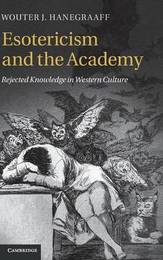
|
Esotericism and the Academy: Rejected Knowledge in Western Culture
Hardback
Main Details
Description
Academics tend to look on 'esoteric', 'occult' or 'magical' beliefs with contempt, but are usually ignorant about the religious and philosophical traditions to which these terms refer, or their relevance to intellectual history. Wouter Hanegraaff tells the neglected story of how intellectuals since the Renaissance have tried to come to terms with a cluster of 'pagan' ideas from late antiquity that challenged the foundations of biblical religion and Greek rationality. Expelled from the academy on the basis of Protestant and Enlightenment polemics, these traditions have come to be perceived as the Other by which academics define their identity to the present day. Hanegraaff grounds his discussion in a meticulous study of primary and secondary sources, taking the reader on an exciting intellectual voyage from the fifteenth century to the present day and asking what implications the forgotten history of exclusion has for established textbook narratives of religion, philosophy and science.
Author Biography
Wouter J. Hanegraaff is Professor of the History of Hermetic Philosophy and Related Currents at the University of Amsterdam, the Netherlands, President of the European Society for the Study of Western Esotericism (ESSWE), and a member of the Royal Dutch Academy of Arts and Sciences. Alongside numerous articles, he is the author of New Age Religion and Western Culture: Esotericism in the Mirror of Secular Thought (1996, 1998); Lodovico Lazzarelli (1447-1500): The Hermetic Writings and Related Documents (2005, with Ruud M. Bouthoorn) and Swedenborg, Oetinger, Kant: Three Perspectives on the Secrets of Heaven (2007). He has also co-edited seven collective volumes, including the Dictionary of Gnosis and Western Esotericism (2005) and Hidden Intercourse: Eros and Sexuality in the History of Western Esotericism (2011, with Jeffrey J. Kripal). His latest work is Western Esotericism: A Guide for the Perplexed (2012).
|